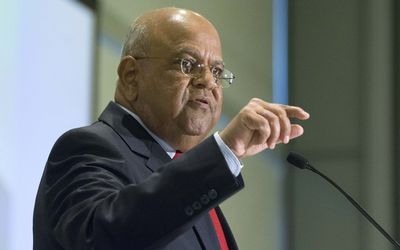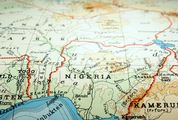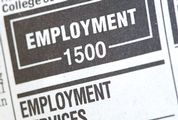FINANCE Minister Pravin Gordhan has a big problem on his hands: he has a huge hole in his budget and the options available to him to fill it are politically fraught or counterproductive to economic growth.
To cut a very long story short, falling gross domestic product (GDP) growth means tax revenues have been coming in below expectations. Despite a R5.2bn reduction in the government’s estimate of expenditure in last year’s medium-term budget policy statement, the books still aren’t quite balancing.
Under normal circumstances, this wouldn’t be so much of a problem — simply run a bigger deficit for a few years — but in a situation where global economic conditions are tough, your political credibility in global capital markets is stuffed, and the rating agencies are threatening to junk your credit rating if you can’t keep your deficit under control, running a bigger deficit simply isn’t an option.
AN ALTERNATIVE approach is to use a combination of cutting expenditure and raising taxes to plug the hole, but in an election year, when the International Monetary Fund has just slashed your economic growth prediction to a miserable 0.7%, neither option is politically or economically palatable.
If Gordhan attempts to rein in expenditure by cutting capital investment, he will be withdrawing much-needed support from the economy at a time when it most needs it, setting us up for even slower growth in future due to infrastructure constraints.
He could also cut expenditure in the public sector by freezing wages or capping allocations to essential services such as health, education, and social grants, but that would go down like a lead balloon in an election year.
On the other side of the equation he could raise taxes, and it was strongly hinted in the mini-budget in October that this is on the cards. The question is which taxes will rise and by how much?
Personal income tax accounts for the largest proportion of total revenue collected — just more than a third in the 2014-15 budget — and as a result of growth in the public sector wage bill, this is one source of revenue that has actually been exceeding estimates in the past year. All well and good, but there is a limit to how much you can tax individuals without negative repercussions.
FOR THOSE of you old enough to remember the film Ferris Bueller’s Day Off, you may recall something called the Laffer Curve. This shows that increasing the tax rate will increase tax revenue only to a point, after which the high tax rate becomes a disincentive to work or an incentive to hide money, and tax revenues start to fall.
More to the point, to fill the hole in the budget through an increase in personal income tax collection, the Treasury would have to increase tax rates by 3 to 5 percentage points. This would not only be massively unpopular politically, but could also fail to raise the money, as the effects of the economic slowdown start to result in job losses and put more pressure on individual finances.
Corporate tax is another option, but with the industrial sector struggling due to low commodity prices, persistent labour issues and consumers who are under pressure due to slow growth and higher interest rates, this would be counterproductive. As Sasfin Securities director and deputy chairman David Shapiro says, "We have to realise that capital flows freely and our companies are competing in a global environment. If we raise corporate tax any more, companies will either find ways around it, or leave."
Shapiro paints a bleak picture of declining revenues and laments the fact that a significant portion of the value of the firms that hold the top spots in the Top 40 index is generated outside SA. Tax is just another cost weighing on the bottom line, and if our companies want to grow and compete on international markets, they need to remain competitive.
THE most likely, but most contentious, tax to increase is value-added tax (VAT). Nazmeera Moola, an economist at Investec Asset Management, explains that what makes VAT so contentious in SA is that there is a general feeling worldwide that VAT is regressive.
"In a country like SA, where there is such high income inequality, increasing a tax that hurts the poor more than the rich seems deeply inequitable," she says. "But recent studies show that this is not the case in SA, and VAT is probably one of the better options the Treasury has at its disposal."
As a result of these concerns and others, Gordhan established the Davis Tax Committee in 2013 to undertake a complete review of the South African tax system, including the effect of increased taxes on economic growth, as well as the distributional effect of several tax structures. What the committee found was surprising.
A study headed by committee member Prof Ingrid Woolard of the University of Cape Town’s School of Economics found that in the absence of zero-rated items, VAT would be regressive, but when the zero-ratings were taken into consideration, VAT was broadly neutral in SA. In other words, households across the income distribution spectrum pay about the same proportion of their income as VAT. While to some it still might not seem fair that the poor are expected to pay tax at all, the findings show that at least VAT does not add to inequality.
INDEED, the study even showed that in some instances, increasing VAT could be progressive. Of equal importance is the fact that the study found that raising VAT was the least bad in terms of its effect on growth when compared to hiking personal or corporate taxes to raise the same amount of revenue. Unfortunately, raising VAT will ultimately be more of an emotional and political decision than a purely rational one. If the public’s response to e-tolls is anything to go by, there certainly isn’t much of an appetite for tax increases of any sort, especially ones that can be avoided.
This means we are most likely to see a combination of tax increases, including such options as a higher fuel levy. On their own, they wouldn’t make much of a dent in the deficit, but together with modest increases in personal and corporate taxes — and even in VAT — they could help reach the target, while sending a positive signal to the financial markets that the government is committed to making the hard choices. We can only hope Gordhan has sufficient political capital to make those tough choices without being overridden.

Pravin Gordhan. Picture: TREVOR SAMSON
FINANCE Minister Pravin Gordhan has a big problem on his hands: he has a huge hole in his budget and the options available to him to fill it are politically fraught or counterproductive to economic growth.
To cut a very long story short, falling gross domestic product (GDP) growth means tax revenues have been coming in below expectations. Despite a R5.2bn reduction in the government’s estimate of expenditure in last year’s medium-term budget policy statement, the books still aren’t quite balancing.
Under normal circumstances, this wouldn’t be so much of a problem — simply run a bigger deficit for a few years — but in a situation where global economic conditions are tough, your political credibility in global capital markets is stuffed, and the rating agencies are threatening to junk your credit rating if you can’t keep your deficit under control, running a bigger deficit simply isn’t an option.
AN ALTERNATIVE approach is to use a combination of cutting expenditure and raising taxes to plug the hole, but in an election year, when the International Monetary Fund has just slashed your economic growth prediction to a miserable 0.7%, neither option is politically or economically palatable.
If Gordhan attempts to rein in expenditure by cutting capital investment, he will be withdrawing much-needed support from the economy at a time when it most needs it, setting us up for even slower growth in future due to infrastructure constraints.
He could also cut expenditure in the public sector by freezing wages or capping allocations to essential services such as health, education, and social grants, but that would go down like a lead balloon in an election year.
On the other side of the equation he could raise taxes, and it was strongly hinted in the mini-budget in October that this is on the cards. The question is which taxes will rise and by how much?
Personal income tax accounts for the largest proportion of total revenue collected — just more than a third in the 2014-15 budget — and as a result of growth in the public sector wage bill, this is one source of revenue that has actually been exceeding estimates in the past year. All well and good, but there is a limit to how much you can tax individuals without negative repercussions.
FOR THOSE of you old enough to remember the film Ferris Bueller’s Day Off, you may recall something called the Laffer Curve. This shows that increasing the tax rate will increase tax revenue only to a point, after which the high tax rate becomes a disincentive to work or an incentive to hide money, and tax revenues start to fall.
More to the point, to fill the hole in the budget through an increase in personal income tax collection, the Treasury would have to increase tax rates by 3 to 5 percentage points. This would not only be massively unpopular politically, but could also fail to raise the money, as the effects of the economic slowdown start to result in job losses and put more pressure on individual finances.
Corporate tax is another option, but with the industrial sector struggling due to low commodity prices, persistent labour issues and consumers who are under pressure due to slow growth and higher interest rates, this would be counterproductive. As Sasfin Securities director and deputy chairman David Shapiro says, "We have to realise that capital flows freely and our companies are competing in a global environment. If we raise corporate tax any more, companies will either find ways around it, or leave."
Shapiro paints a bleak picture of declining revenues and laments the fact that a significant portion of the value of the firms that hold the top spots in the Top 40 index is generated outside SA. Tax is just another cost weighing on the bottom line, and if our companies want to grow and compete on international markets, they need to remain competitive.
THE most likely, but most contentious, tax to increase is value-added tax (VAT). Nazmeera Moola, an economist at Investec Asset Management, explains that what makes VAT so contentious in SA is that there is a general feeling worldwide that VAT is regressive.
"In a country like SA, where there is such high income inequality, increasing a tax that hurts the poor more than the rich seems deeply inequitable," she says. "But recent studies show that this is not the case in SA, and VAT is probably one of the better options the Treasury has at its disposal."
As a result of these concerns and others, Gordhan established the Davis Tax Committee in 2013 to undertake a complete review of the South African tax system, including the effect of increased taxes on economic growth, as well as the distributional effect of several tax structures. What the committee found was surprising.
A study headed by committee member Prof Ingrid Woolard of the University of Cape Town’s School of Economics found that in the absence of zero-rated items, VAT would be regressive, but when the zero-ratings were taken into consideration, VAT was broadly neutral in SA. In other words, households across the income distribution spectrum pay about the same proportion of their income as VAT. While to some it still might not seem fair that the poor are expected to pay tax at all, the findings show that at least VAT does not add to inequality.
INDEED, the study even showed that in some instances, increasing VAT could be progressive. Of equal importance is the fact that the study found that raising VAT was the least bad in terms of its effect on growth when compared to hiking personal or corporate taxes to raise the same amount of revenue. Unfortunately, raising VAT will ultimately be more of an emotional and political decision than a purely rational one. If the public’s response to e-tolls is anything to go by, there certainly isn’t much of an appetite for tax increases of any sort, especially ones that can be avoided.
This means we are most likely to see a combination of tax increases, including such options as a higher fuel levy. On their own, they wouldn’t make much of a dent in the deficit, but together with modest increases in personal and corporate taxes — and even in VAT — they could help reach the target, while sending a positive signal to the financial markets that the government is committed to making the hard choices. We can only hope Gordhan has sufficient political capital to make those tough choices without being overridden.




















Change: -1.54%
Change: -1.49%
Change: -2.02%
Change: -0.73%
Change: -4.01%
Data supplied by Profile Data
Change: 0.10%
Change: -0.45%
Change: -1.54%
Change: 0.00%
Change: -0.64%
Data supplied by Profile Data
Change: 0.47%
Change: 0.28%
Change: 0.34%
Change: 0.07%
Change: 0.12%
Data supplied by Profile Data
Change: -0.15%
Change: 0.00%
Change: 0.20%
Change: -0.34%
Change: -0.17%
Data supplied by Profile Data